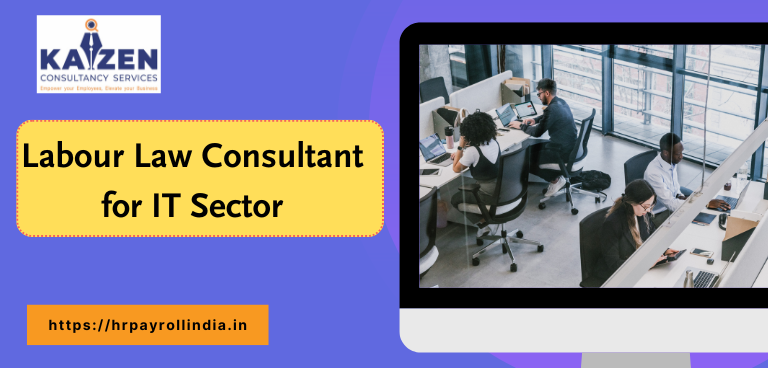Labour Law Consultant
for IT Sector
Labour laws in India are designed to protect employee rights, regulate working conditions, and ensure fair treatment in the workplace. For the IT sector, which operates in a highly dynamic and competitive environment, compliance with these laws is crucial, explained in this post by Labour Law Consultant for IT Sector – Kaizen Consultancy

Labour Law Consultant for IT Sector - Importance
Labour laws in India are designed to protect employee rights, regulate working conditions, and ensure fair treatment in the workplace. For the IT sector, which operates in a highly dynamic and competitive environment, compliance with these laws is crucial. Key legislations such as the Shops and Establishments Act, Payment of Wages Act, Maternity Benefit Act, and Employees’ Provident Fund (EPF) Act apply to IT companies. Adherence to these laws not only ensures legal compliance but also fosters a positive work culture, reduces employee turnover, and enhances organizational reputation.
The Growing Complexity of Labour Law in the IT Sector
The IT sector has witnessed exponential growth in recent years, leading to an increase in workforce size and diversity. This growth has brought about unique challenges in managing compliance with labour laws. For instance:
Remote Work Policies: With remote work becoming the norm, companies must address compliance issues related to working hours, overtime pay, and employee benefits.
Employee Classification: Misclassification of employees as contractors or freelancers can lead to penalties under labour laws.
Frequent Amendments: Labour laws are subject to frequent changes, making it difficult for businesses to stay updated. These complexities necessitate the need for expert guidance from labour law consultants who specialize in navigating these challenges.
Labour Law Compliance for IT Sector: A Challenge
Compliance with labour laws is particularly challenging for IT companies due to their unique
operational structure. Common challenges include:
Extended Working Hours: Many IT employees work beyond prescribed hours without proper overtime compensation, violating the Payment of Wages Act.
Night Shifts: Frequent night shifts without adequate safety measures or additional compensation often breach labour regulations.
Maternity Benefits: Non-compliance with the Maternity Benefit Act by failing to provide paid maternity leave or crèche facilities is a recurring issue.
Statutory Registrations: Timely registration under EPF, ESI, and other applicable acts is often overlooked by startups and small IT firms.
How Labour Law Consultants Assist IT Businesses
Labour law consultants play a vital role in ensuring compliance while allowing IT companies to focus on their core operations. Here’s how they help:
1. Expert Advisory Services:
Consultants provide specialised advice on applicable labour laws such as EPF, ESI, Minimum Wages Act, and more. They ensure that businesses understand their obligations and implement compliant policies.
2. Compliance Audits:
Regular audits help identify gaps in compliance and rectify them before they escalate into legal issues. These audits cover payroll processes, employee benefits, statutory filings, and more.
3. Policy Development:
Consultants assist in drafting HR policies that align with legal requirements while addressing organizational needs like remote work policies or flexible working hours.
4. Handling Legal Disputes:
Labour law consultants mediate disputes between employers and employees, ensuring amicable resolutions while minimizing legal risks.
5. Keeping Businesses Updated:
With frequent amendments to labour laws, consultants keep businesses informed about changes and help them adapt accordingly.
Avoid Costly Mistakes: Why Every Business Needs Labour Law Consultants
Non-compliance with labour laws can result in severe penalties, lawsuits, and reputational damage.
For example:
- Failing to pay EPF contributions on time can attract fines and interest charges under the EPF
Act. - Non-compliance with ESI provisions can lead to prosecution under the Employees’ State
Insurance Act. - Ignoring maternity benefits can result in penalties under the Maternity Benefit Act.
Labour law consultants help businesses avoid these costly mistakes by ensuring timely compliance with all statutory requirements.
Retail Compliance vs IT Sector Compliance
While retail compliance focuses on aspects like consumer protection laws and shop timings under the Shops and Establishments Act, IT sector compliance involves unique challenges such as remote work policies, data privacy concerns, and extended working hours management. Labour law consultants specialised their services to address sector-specific needs effectively.

The Ultimate Guide to Statutory Compliance in India 2025
For IT businesses aiming for seamless statutory compliance in 2025, here are key steps:
1. Timely Registrations:
Register under EPF, ESI, Shops and Establishments Act immediately upon crossing employee thresholds.
2. Regular Filings:
File monthly returns (e.g., EPF by 15th of each month) without fail.
3. Employee Awareness Programs:
Educate employees about their rights under applicable labour laws.
4. Periodic Audits:
Conduct regular audits to ensure all processes are compliant.
5. Seek Expert Guidance:
Partnering with experienced labour law consultants ensures hassle- free compliance.
Conclusion
Labour law compliance for IT sector businesses is not just a legal requirement but a strategic necessity to foster employee trust and organizational growth. Given the complexities of modern-day operations and frequent legislative changes, partnering with experienced labour law consultants is indispensable for IT companies. By leveraging their expertise in statutory compliance, policy development, and dispute resolution, consultants enable businesses to focus on innovation while staying legally secure.
If you’re an IT business seeking expert assistance in navigating labour law compliance challenges seamlessly, consider reaching out to trusted advisors like Kaizen Consultancy Services for comprehensive solutions tailored to your needs!
Labour law compliance in the IT sector is a complex. From managing remote work policies to navigating multi-state regulations, specialized consultants play a pivotal role in simplifying compliance. IT Businesses in Mumbai, Delhi, and other cities must prioritize adherence to acts like EPF, and ESI to avoid penalties, secure contracts, and foster a safer workplace.
Contact our expert Labour Law Consultants for IT Sector – Kaizen Consultancy Services today to streamline your construction compliance!
